Ron Paul: Audit the Fed, Then End It!
I have been very pleased with the progress of my legislation, HR 1207, which calls for a complete audit of the Federal Reserve and removes many significant barriers towards transparency of our monetary system. This bill now has nearly 170 cosponsors, with support from both Republicans and Democrats. Senator Bernie Sanders has introduced a companion bill in the Senate S 604, which will hopefully begin to gain momentum as well. I am very encouraged to see so many of my colleagues in Congress stand with me for greater transparency in government.
Some have begun to push back against this bill, and I am very happy to address their concerns.
The main argument seems to be that Congressional oversight over the Fed is government interference in the free market. This argument shows a misunderstanding of what a free market really is. Fundamentally, you cannot defend the Federal Reserve and the free market at the same time. The Fed negates the very foundation of a free market by artificially manipulating the price and supply of money – the lifeblood of the economy. In a free market, interest rates, like the price of any other consumer good, are decentralized and set by the market. The only legitimate, Constitutional role of government in monetary policy is to protect the integrity of the monetary unit and defend against counterfeiters.
Instead, Congress has abdicated this responsibility to a cabal of elite, quasi-governmental banks who, instead of stabilizing the economy, have destabilized it. It took less than two decades for the Federal Reserve to bring on the Great Depression of the 1930’s. It has also inflated away the value of our currency by over 96 percent since its inception. It has invisibly stolen from the poor and given to the rich through this controlled inflation, and now openly stolen through recent bank bailouts. It has predictably exacerbated the very problems it was meant to solve.
Detractors have also argued that the Fed must remain immune from the political process, and that that more congressional oversight would distort their very important decisions. On the contrary, the Federal Reserve is already heavily entrenched in the political process, as the Fed chairman is a political appointee. High level officials routinely make the rounds between positions at the Fed, member banks, Treasury and back again, taking care of friends and each other along the way.
As far as the foolishness of placing complex monetary policy decisions in the hands of politicians – I couldn’t agree more. No politician or central banker, no matter how brilliant, is smart enough to know more than the market itself. The failure of central economic planning has been witnessed over and over. It is frankly beyond me why we ever agreed to try it again.
To understand how unwise it is to have the Federal Reserve, one must first understand the magnitude of the privileges they have. They have been given the power to create money, by the trillions, and to give it to their friends, under any terms they wish, with little or no meaningful oversight or accountability. Thus the loudest arguments against greater transparency are likely to come from those friends, and understandably so.
However, it is the responsibility of every member of Congress to represent the interests of the people that sent them to Washington and find out what has been happening with our money. As the branch of government with the power of the purse, we really have no other reasonable choice when the economy is in the shape it is in.
Some have begun to push back against this bill, and I am very happy to address their concerns.
The main argument seems to be that Congressional oversight over the Fed is government interference in the free market. This argument shows a misunderstanding of what a free market really is. Fundamentally, you cannot defend the Federal Reserve and the free market at the same time. The Fed negates the very foundation of a free market by artificially manipulating the price and supply of money – the lifeblood of the economy. In a free market, interest rates, like the price of any other consumer good, are decentralized and set by the market. The only legitimate, Constitutional role of government in monetary policy is to protect the integrity of the monetary unit and defend against counterfeiters.
Instead, Congress has abdicated this responsibility to a cabal of elite, quasi-governmental banks who, instead of stabilizing the economy, have destabilized it. It took less than two decades for the Federal Reserve to bring on the Great Depression of the 1930’s. It has also inflated away the value of our currency by over 96 percent since its inception. It has invisibly stolen from the poor and given to the rich through this controlled inflation, and now openly stolen through recent bank bailouts. It has predictably exacerbated the very problems it was meant to solve.
Detractors have also argued that the Fed must remain immune from the political process, and that that more congressional oversight would distort their very important decisions. On the contrary, the Federal Reserve is already heavily entrenched in the political process, as the Fed chairman is a political appointee. High level officials routinely make the rounds between positions at the Fed, member banks, Treasury and back again, taking care of friends and each other along the way.
As far as the foolishness of placing complex monetary policy decisions in the hands of politicians – I couldn’t agree more. No politician or central banker, no matter how brilliant, is smart enough to know more than the market itself. The failure of central economic planning has been witnessed over and over. It is frankly beyond me why we ever agreed to try it again.
To understand how unwise it is to have the Federal Reserve, one must first understand the magnitude of the privileges they have. They have been given the power to create money, by the trillions, and to give it to their friends, under any terms they wish, with little or no meaningful oversight or accountability. Thus the loudest arguments against greater transparency are likely to come from those friends, and understandably so.
However, it is the responsibility of every member of Congress to represent the interests of the people that sent them to Washington and find out what has been happening with our money. As the branch of government with the power of the purse, we really have no other reasonable choice when the economy is in the shape it is in.
-----
U.S. Rep. Ron Paul is a Republican representing the 14th District of Texas. He sought the Republican presidential nomination last year.
* * *
Labels: FED, fiat money, Ron Paul















![[Most Recent Quotes from www.kitco.com] [Most Recent Quotes from www.kitco.com]](http://www.kitco.com/images/live/t24_au_en_usoz_6.gif)
![[Most Recent Quotes from www.kitco.com] [Most Recent Quotes from www.kitco.com]](http://www.kitco.com/images/live/au_go_0030_ny.gif)
![[Most Recent Quotes from www.kitco.com] [Most Recent Quotes from www.kitco.com]](http://www.kitco.com/images/live/au_go_0365_ny.gif)
![[Most Recent Quotes from www.kitco.com] [Most Recent Quotes from www.kitco.com]](http://kitconet.com/charts/metals/silver/t24_ag_en_usoz_4.gif)




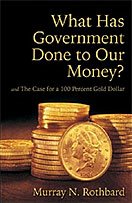

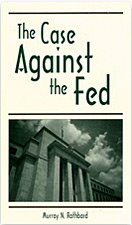

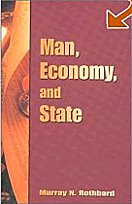

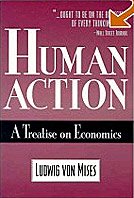
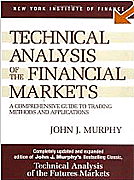





2 ΣΧΟΛΙΑ (COMMENTS):
"The Fed negates the very foundation of a free market by artificially manipulating the price and supply of money – the lifeblood of the economy."
Φοβερή ατάκα! Με δυο λόγια, βάζοντας στην ίδια πρόταση δύο ασύμβατες έννοιες που χτυπάνε τα κουδούνια στον αναγνώστη, τα είπε όλα.
Όμως μου προκαλεί και μια μελαγχολία. Ξέρετε πολλούς Έλληνες πολιτικούς , που μπορούν να θέσουν τόσο σοβαρά ζητήματα σε διάλογο ; Και ξέρετε το ελληνικό πολιτικό σύστημα να δίνει την δυνατότητα σε έναν πολιτικό να αναλάβει κάποια τέτοια πρωτοβουλία και να φέρει σχέδιο νόμου που ο ίδιος έχει εμπνευστεί και επεξεργαστεί ;
Μελαγχολία για το πολιτικό μας προσωπικό και για το πολιτικό μας σύστημα. Μήπως η πρόταση της ΦΣ για ομοσπονδιοποίηση της Ε.Ε. θα άλλαζε και τις συνθήκες μέσα στις οποίες λειτουργεί η αντιπροσωπευτική δημοκρατία και οι θεσμοί της ; Μήπως επιτέλους θα βλέπαμε πραγματικούς πολιτικούς και όχι πολιτικάντηδες ;
....ο Ron Paul αποτελεί ιδιαίτερη προσωπικότητα και πολιτικός, όχι μόνο για τα δικά μας δεδομένα (εννοείται!!) αλλά και σε διεθνή κλίμακα!
Το γεγονός βέβαια ότι μπορεί και βγαίνει ακόμα να μιλάει έτσι στο κοινοβούλιο, επιδιώκοντας τέτοιους στόχους, κάτι μας λέει για τη λειτουργία της δημοκρατίας στις ΗΠΑ..
Σίγουρα θα ήταν αλλιώς και καθ'ημάς εάν υλοποιούντο οι προτάσεις της Φ.Σ. μέσα στα ευρωπαϊκά πλάισια!..
Δυστυχώς βέβαια με πιάνει κι'εμένα απογοήτευση όταν βλέπω το επίπεδο της πολιτικής και των πολιτικών μας να βρίσκεται ακόμα σε εμβρυακή φάση του τύπου "συνοικιακού καφενείου"...
...έχει πολύ δρόμο ακόμα η ενηληκίωση!
Post a Comment
<< Home